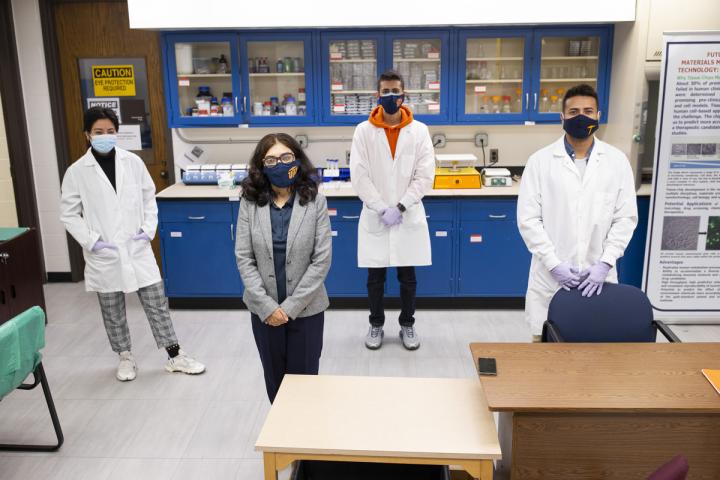
Credit: Ivan Pierre Aguirre / UTEP Communications.
EL PASO, Texas – November is National Diabetes Month, a time when the nation comes together to shed light on one of the leading causes of death and disability among U.S. citizens. The University of Texas at El Paso (UTEP) is joining the fight against the disease through innovative research made possible through a recent $1.2 million grant by the National Institutes of Health (NIH) to advance understanding of a critical diabetic heart condition.
The project will use 3D bioprinting to better understand how type 2 diabetes progresses inside the human body. The research team will re-create cardiac tissue, made up of human cardiac cells from both diabetic and healthy donors, to form a heart model closely resembling actual heart tissue found inside the human body with an electrical rhythm that can contract, relax and function as a human heart would.
Binata Joddar, Ph.D., associate professor of biomedical engineering in the metallurgy, materials and biomedical engineering department at UTEP, is leading the cutting-edge research.
“We are going to compare how the progression of diabetes is affecting the functions of healthy and diabetic cells and tissue,” Joddar said. “We are going to study the effect of diabetes progression and how it affects the normal electrical rhythm of the heart when diabetes is advancing in these cells and how it impacts the individual behavior of the cells.”
Joddar’s research will focus on cardiomyopathy, a heart condition often experienced by patients with type 2 diabetes, where the heart wall remodels itself and can become either thinner or thicker and affect the heart’s ability to pump blood and properly oxygenate the body. This condition often leads to catastrophic outcomes for patients such as heart failure and death.
“Cardiomyopathy is a huge problem for type 2 diabetes patients,” Joddar said. “There is a lack of targeted treatment for this condition. It can only be diagnosed by clinicians, and once diagnosed, there is only symptom management available with no real cure.”
Once Joddar and her team of student researchers successfully creates the cardiac tissue model, they also will be able to use it for cardiac toxicity screening to see how certain common drugs approved by the U.S. Food and Drug Administration impact the heart.
“Patients with diabetes, cancer and other diseases typically take a lot of drugs to treat their symptoms, but often a little of the dose gets mixed in the bloodstream and circulates through the heart muscle and is toxic to cardiac tissue. The cardiac model we create can be used to screen the toxicity of certain common drugs,” Joddar said.
The project will expose UTEP students to bioengineering research and provide hands-on experience to empower the next generation of scientists and engineers to advance diabetes research and awareness.
“Dr. Joddar’s research is both innovative and impactful,” said Patricia Nava, Ph.D., dean of UTEP’s College of Engineering. “We are proud to have the facilities and capacity for her to carry out her comparative studies of diabetic and healthy cardiac tissue and changes invoked by medication, as this is sure to shed light not only on basic research, but also clinical treatment of patients. This innovative research is important to the community and global population of diabetes patients and will be a prime opportunity for UTEP engineering students to contribute to impactful, life-changing research.”
###
The University of Texas at El Paso is one of the largest and most successful Hispanic-serving institutions in the country, with a student body that is 83% Hispanic. It enrolls nearly 25,000 students in 166 bachelor’s, master’s and doctoral programs in 10 colleges and schools. With more than $100 million in total annual research expenditures, UTEP is ranked in the top 5% of research institutions nationally and fifth in Texas for federal research expenditures at public universities.
Media Contact
Victor H. Arreola
[email protected]
Original Source
http://www.




